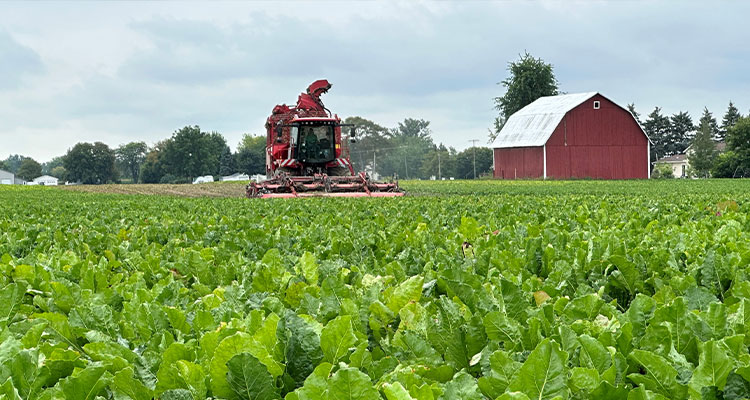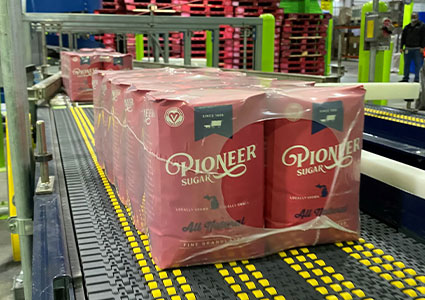How Michigan Sugar Company plans to produce 80 million additional pounds of sugar without planting another acre of sugar beets
Things are getting even sweeter at Michigan Sugar Company thanks to the largest capital investment made in the company’s nearly 120-year history.
In May 2024, the grower-owned cooperative began operations of its new, $109 million molasses desugarization facility, located on the grounds of its sugar beet processing plant in Bay City, Michigan. The facility allows Michigan Sugar to process and remove additional sugar from 100 percent of the molasses it produces as a byproduct of the sugar extraction process. Simply put, Michigan Sugar can now produce up to 80 million additional pounds of sugar annually without planting another acre of sugar beets.
What’s more, over a ten-year period, the company’s grower-owners are expected to see millions of dollars in added revenue, annually, from the sale of the additional sugar.
 “This story is not just about economic development, but about sustainability,” said Jim Roggenbuck, one of Michigan Sugar’s roughly 865 grower-owners, who operates Helena Farms in Harbor Beach, Michigan, and serves as Chairman of the Michigan Sugar Co-op Board of Directors. “It means 80 million more pounds of sugar without any additional passes over our farm fields with our equipment, without any further spraying of our crops to ward off disease and pests, and without using any additional fuel on our farms to expand operations.”
“This story is not just about economic development, but about sustainability,” said Jim Roggenbuck, one of Michigan Sugar’s roughly 865 grower-owners, who operates Helena Farms in Harbor Beach, Michigan, and serves as Chairman of the Michigan Sugar Co-op Board of Directors. “It means 80 million more pounds of sugar without any additional passes over our farm fields with our equipment, without any further spraying of our crops to ward off disease and pests, and without using any additional fuel on our farms to expand operations.”
Roggenbuck, whose family has been growing sugar beets in Michigan’s Thumb Region for generations, explained the new facility allows Michigan Sugar to increase its daily molasses processing capacity from 325 tons to 650 tons.
“We have had desugaring technology in place in Bay City since the 1990s, but we were previously only able to process about 60 percent of the molasses we produced,” he said. “Also, the new technology allows us to capture a higher percentage of sugar from the molasses. One ton of molasses has about 1000 pounds of sugar. Our previous technology captured about 700 pounds of sugar per ton; our new equipment captures 800 pounds, an increase of more than 14 percent.”
Roggenbuck said the start-up of the molasses desugarization facility ranks among the most significant milestones in the company’s history, right up there with the company becoming a grower-owned cooperative in 2002 and merging with rival Monitor Sugar Company in 2004.
“This facility not only is an investment in our company, but an investment in our collective future,” he said. “As shareholders, it is important that we continue to position ourselves to succeed for another 120+ years. The decisions and investments we are making today will have an impact on generations of sugar beet growers to come.
“We are proud of our rich history but must never stop looking forward to the future.”
A sweet history
Michigan’s sugar beet industry was born in the late 1800s, facilitated by the need for a new economic driver. State and local leaders were searching for a substitute for the jobs and money generated by now-departed lumber barons. A solution was needed that could be replenished each year, bringing a stabilizing influence on the economic base of the region.
Enter the sugar beet. Interest in the sugar beet peaked in 1884, when Joseph Seemann, a Saginaw printer, happened to see how well the sugar beet was doing for the people in a region of Germany that he visited. Another trip convinced him to send a sample of the seeds to his partner, who forwarded them to Dr. Robert C. Kedzie, professor of chemistry at Michigan State Agricultural College (now Michigan State University). Dr. Kedzie’s enthusiasm for the beet’s potential earned him the title “Father of the Michigan Beet Sugar Industry.”
He imported 1500 pounds of seeds from France and distributed them to farmers across Michigan. Funds were raised by boiler manufacturer Harry T. Wickes, Thomas A. Harvey, and grain merchant George B. Morley to underwrite beet-growing tests. Invitations to farmers for seed and instructions were issued. This resulted in bringing samples of beets from 600 farms to Dr. Kedzie’s laboratory.
“Three crops of beets,” he said, “grown in three successive years are worth as much as one crop of pine trees, which required 100 years to mature.”
Suddenly, sugar beet processing companies began popping up all over Michigan.
Michigan Sugar Company was established in 1906 when six smaller sugar beet processing companies merged their operations. Today, the company is headquartered in Bay City and operates some of the oldest sugar beet processing facilities in the United States – one each in Bay City (built in 1901), Caro (1899), Croswell (1902), and Sebewaing (1902).
These facilities are important economic drivers of Michigan’s Thumb and Great Lakes Bay regions, employing 1000 year-round employees and an additional 1100 seasonal workers. The company’s annual payroll is nearly $90 million, and its annual local economic impact is more than $700 million.
“Michigan Sugar Company is the third largest of eight sugar beet processing companies in the United States and Michigan is one of 11 states where sugar beets are grown in the country,” explained Neil Juhnke, Michigan Sugar’s President and CEO. “We are blessed with having nutrient-rich soil in Michigan, some of the best on Earth, and a climate that is conducive to a long growing season with no irrigation needed, and proper storage of harvested sugar beets.”
Each year, Michigan Sugar’s grower-owners plant and harvest about 140,000 acres of sugar beets in 17-to-20 Michigan counties, as well as Ontario, Canada. Those beets are sliced at the factories and turned into about 1.3 billion pounds of sugar annually. That sugar is sold to industrial, commercial, and retail customers under the Pioneer brand.
“We are located within 300-to-400 miles of the largest sugar market in North America, and we have quick, convenient access to key in-state and interstate highway and water transportation routes ensuring on-time delivery to customers,” said Juhnke. “On the retail side of our business, we package white granulated, light and dark brown, and powdered sugar. The Pioneer brand can be found on the shelves of stores in more than 15 states, including Costco, Gordon Food Service, Kroger, Meijer, and Walmart.”
Spotlight on sustainability 
Construction of the new molasses desugarization facility aligns perfectly with Michigan Sugar Company’s aspirations to produce, package, and distribute world-class products while being a leader in corporate and agricultural sustainability. Through environmental stewardship, progressive farming practices, safe and healthy workplaces, and service to the community, Juhnke says the company is committed to creating a responsible business model for its grower-owners, employees, customers, suppliers, and other stakeholders now and in the future.
“We are committed to continuous improvement programs in the areas of energy use, water use and reuse, carbon dioxide emissions, and material and packaging waste management and recycling,” he said. “Since becoming a grower-owned cooperative, Michigan Sugar has cut its energy consumption by more than 40 percent and reduced its carbon footprint dramatically.”
For example, in 2014, the company converted its Caro factory coal boiler to clean burning natural gas and in 2015 did the same at its factory in Croswell. These conversions alone have reduced annual carbon emissions by 25 percent. In 2021, Michigan Sugar replaced two coal-fired lime kilns at its Croswell factory with a new natural gas-fired lime kiln expected to result in annual energy savings for the company of $300,000.
“By investing in state-of-the-art, energy-efficient technology throughout our factories, Michigan Sugar has achieved a total reduction in annual carbon emissions of 150,000 tons,” said Juhnke. “Today, more than 87 percent of the company’s factory operations are powered by clean-burning natural gas.”
Michigan Sugar’s commitment to sustainability continues in the fields of its grower-owners who are proud to plant GMO (Genetically Modified Organisms) sugar beet seed that has allowed them to increase yields by 50 percent while reducing the number of passes made across their fields by 65 percent over the past 15 years.
“In some ways, we’ve been doing things basically the same way they were done back in 1906 when our company was founded,” said Juhnke. “The process of extracting sugar from beets really hasn’t changed much over the years. But projects like our new molasses desugarization facility are changing the game for us as they allow us to continue growing in a sustainable way.”
Inside MDS
Nick Klein, Michigan Sugar Company’s Vice President of Operations, says the new molasses desugarization facility is more than just a place for production.
“It is a symbol of innovation, efficiency, and progress,” he said, noting the 22,000-square-foot facility took nearly four years to complete – from conception, to engineering, to construction, to start-up. “The significance of this project cannot be overstated as it aligns perfectly with our mission: Creating Growth & Opportunity, and our purpose: Making Life Sweeter.”
Ground was broken on the project in June 2022 with Michigan Sugar Company serving as the general contractor and Pumford Construction of Saginaw as the Civil/Structural Contractor. During the project, nearly 30 subcontractors played a part in constructing the facility, including ESCON GmbH of Berlin, Germany, VEI Global Engineering of Fargo, North Dakota, and a handful of Michigan-based companies, including MAP Mechanical, Dobson Industrial Inc., W. Soule & Company, Conti Corp., JLA Insulation & Fabrication, County Line Power, and McNally-Nimergood.
The facility came online on Monday, May 20, 2024, after more than 160,000 safe working man hours were recorded.
“This facility puts us on the leading edge of our industry in terms of desugarization capacity and technology,” said Klein. “And we built it without a single lost-time incident, a remarkable accomplishment only made possible through excellence in planning, execution, and teamwork.”
Community leaders from throughout Bay County have lauded the project.
“As one of our township’s largest taxpayers and employers, we depend greatly on Michigan Sugar Company as a pillar of our economy,” said Terry Spencer, Supervisor of Monitor Township, where the company’s Bay City factory is actually located. “It never ceases to amaze me the ongoing investments this company makes to benefit the community. Michigan Sugar literally invests millions of dollars each year to improve its facilities and operations. We are so fortunate the company’s grower-owners have continued to invest here year after year.”
Jim Reaume, President and CEO of Bay Future Inc., called the project ‘exciting, substantial, and transformational.’
“The impact of this project will have a ripple effect throughout Bay County, the Great Lakes Bay region, the State of Michigan, and beyond,” he said. “This investment will provide both direct and indirect benefits across businesses and to community members who call Bay County and the region home. I am thankful for Michigan Sugar Company – for their leadership, and for their long-standing financial investment in economic development in Bay County.”
Onward and upward
Juhnke, who became Michigan Sugar Company’s President and CEO in April 2023, continuing a career in the agribusiness sector that stretches back to 1990, said Michigan Sugar is on a journey to go from Good to Great, harnessing lessons taught in the 2001 best-selling book with the same name by author Jim Collins.
Most recently, the company’s board of directors voted to implement a new Quality Beet Payment formula that will take effect with the 2025 crop. The new formula better aligns with the company’s processing economics, incentivizing the production of recoverable sugar over tons of sugar beets harvested.
“The result will drive a change in agronomic practices, specifically a reduction in the amount of nitrogen growers spread on their sugar beet fields,” said Juhnke. “The way I see it, this new formula provides an opportunity to make an investment in our future with an infinite return. It requires no capital investment, reduces costs and impacts on the farm, and is designed to provide an opportunity to increase revenue per acre for our grower-owners.”
When it comes to sustainability, Michigan Sugar is always happy to celebrate its successes.
“But we can never rest on our past accomplishments,” said Juhnke. “We must always have an eye on the future and how we can improve our business. The goal is to be the best sugar company in the world, so every day we must work with an onward and upward mindset.
“That’s what we’re all about at Michigan Sugar Company.”

